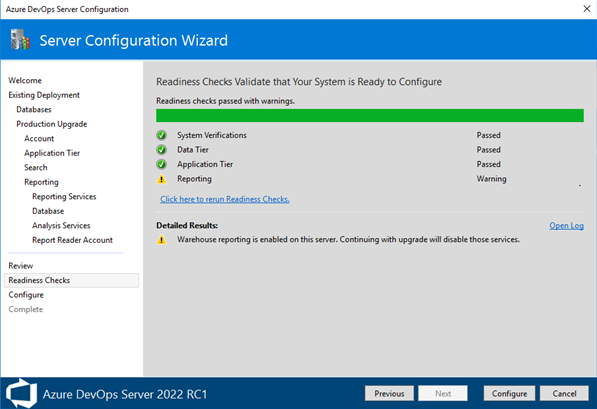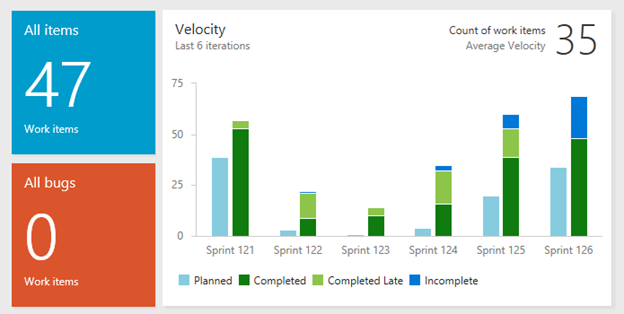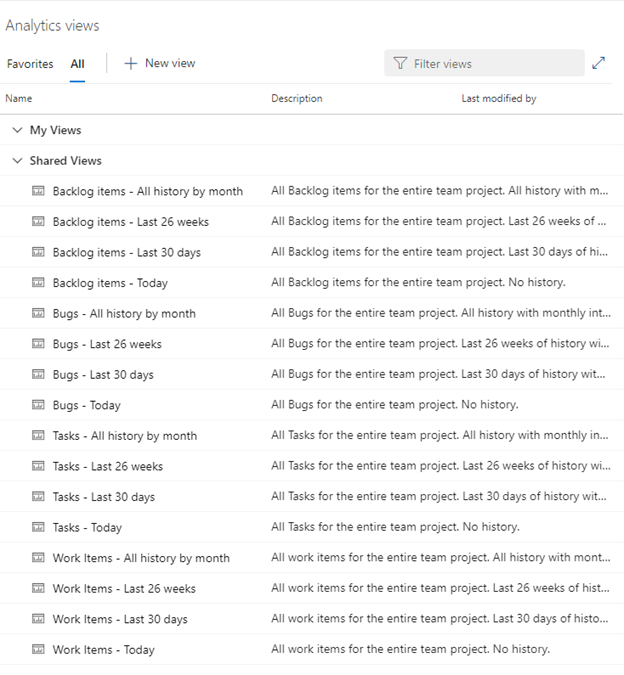As part of the Azure DevOps Server 2022 release, we wanted to reiterate the deprecation of the existing data warehouse reporting services. We previously announced this in the Azure DevOps Server 2020 release notes. The warehouse reporting service has been part of TFS and Azure DevOps for over a decade. We felt this release was the right time to deprecate the old technology and debt while we continue our commitment with the new Analytics Service.
Hello Analytics Service 👋
In Azure DevOps Server 2019.1, we released the Analytics Service as part of the core product. This service opened up a variety of new reporting scenarios:
- Enabled several new dashboard widgets
- In-context reports such as team velocity, sprint burndown, etc.
- Roll-up columns
- Integration with Power BI reports
- Analytics data that is fully accessible via OData
We continued to add features and improve on the Analytics Services in Server 2020.
If you are not familiar with the Analytics Service, please see this documentation to get started.
What happens when I upgrade?
When upgrading to Azure DevOps Server 2022, you will be required to disable the existing warehouse reporting services. The update wizard will automatically disable it for you. Disabling of the reporting services is required to complete the Server 2022 upgrade.
What about existing reports?
Many of your existing reports will be accessible by a combination of the Analytics Service features as described above. Some of them will be solved using Dashboard Widgets and others will be solved with Analytics views or custom OData queries.
For customized reports, you can use Analytic Views to generate a view of data you need and export that into Power BI. To get you started, a set of default Analytics views are defined for each project. You can then view, modify, and create your own views to fit your needs.
Existing reports are not migrated into the Analytics Service. You will need to re-create the reports and charts manually. Please review the below documentation and create your new reports before starting your Azure DevOps 2022 upgrade.
- Migrate to Analytics from SQL Reporting Services for Azure DevOps
- Get Analytics insights comparable to those provided by SQL Reporting Services reports
- Analytics work item fields reference
Learn more
The Analytics Service has been available since Azure DevOps Server 2019.1 and is ready to be the sole reporting solution for both the service and on-prem products. We hope you find this article as a useful guide to prepare yourself for Azure DevOps Server 2022 and the changes to the Reporting Services.
Here are some helpful resources on getting started and building reports with the Analytics Service.
- What is the Analytics service?
- About Power BI integration
- What are Analytics views?
- Extend Analytics with OData
- Migrate to Analytics from SQL Reporting Services for Azure DevOps
- Get Analytics insights comparable to those provided by SQL Reporting Services reports
- Analytics work item fields reference




What about the XML templates and the DWH?
Azure DevOps Server 2022 will continue to support them?
per the post, data warehouse is being deprecated in server 2022. XML collections will continue to be supported.
Question 1: Will there be an update to the ElasticSearch java libraries that removes the security risk the current libraries introduce? Will there be a newer, secure version of ElasticSearch included in Azure DevOps Server 2022?
Question 2: Is there a release date confirmed yet? At least to the month and year?
We are doing a ton of component governance work, that is the main reason for the delay. We expect to have all the security and dependency updates done for Server 2022. Looking at late July for RC1.
Hi.
Thanks for the post and for replies. I was wondering for quite a long time now. Is there any web page or any information source where it is possible to find information on release dates for future versions of ADO Server editions? In the past one could at least depend on MS Build where usually some information was released, but not anymore. I am just asking why all the secrecy about the future releases and plans about ADO Server? Really find any relevant information from valid source is nearly impossible. If you are indicating that the first RC of...
I cannot agree with this more. There are so many sectors (legal, governmental, private IP, etc.) that rely on hosting ADO Server on-prem. Of all the improvements Microsoft needs to make to ADO Server, the first should be an Azure DevOps Server communications plan supported by a web page dedicated to the transparency of the ADO Server roadmap with links to all related blogs and feature/bug requests. It would surprise no one who watches this space if Microsoft has been evaluating the GitHub and GitLab on-prem offerings with an eye to someday combining DevOps Server and DevOps Services. It would...
Rest assured we are going to continue to invest in the Azure DevOps Service and On-Prem product. We are in the process of getting the roadmap updated with the most recent plans and information. More coming soon.
Hi,
will there be Analytics for Tests and TestRuns as well as for Pipelines (Build/Releases)?
Hi,
is there already a release date for Azure DevOps Server 2022? At least a date for a release candidate version?
Yeah it got pushed back a few months as we focused on a few high priority quality updates. Right now I think we are looking at sometime in July.
Yes, last time (before this post) Microsoft mentioned Azure DevOps Server 2022, it was declared, that it will be out in Q1 2022. So…